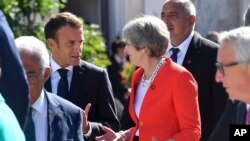European Union nations, voicing worries over a U.N. report on global warming, were haggling on Tuesday over how ambitious to be in cutting vehicle emissions, with Germany warning that overly-challenging targets risked harming industry and jobs.
Torn between reducing pollution and preserving industry competitiveness, EU environment ministers meeting in Luxembourg are seeking a compromise over what 2030 carbon dioxide limits to impose on Europe's powerful carmakers.
In a joint statement, they said the bloc was "deeply concerned" over a U.N. report calling for rapid and unprecedented action to contain global warming, but held back from increasing their pledge to reduce emissions under the 2015 Paris climate accord.
Several ministers sought a higher, 40 percent reduction in vehicle emissions, in line with targets backed by EU lawmakers last week. "Everyone is calling for action after the report," French Environment Minister Francois de Rugy said.
But two EU sources said some nations appeared to be siding with a less ambitious reduction.
Germany, with its big auto sector, backs an EU executive proposal for a 30 percent cut for fleets of new cars and vans by 2030, compared with 2021 levels.
"After the (U.N.) report yesterday that is not easy, but it is a position we all agreed on," Germany's Svenja Schulze said.
Too close to call
Climate campaigners say Germany has still not learned to be tougher on the auto industry, despite the scandal that engulfed Volkswagen in 2015 when it admitted to using illegal software to mask emissions on up to 11 million diesel vehicles worldwide.
EU sources said Germany, with the backing of eastern European nations, might have enough votes to secure a majority at the meeting among the bloc's 28 nations.
Austria, which holds the EU's rotating presidency, has proposed a compromise 35 percent reduction in emissions.
"It's too close to call," said Greg Archer, an expert with Brussels-based campaign group Transport & Environment.
If they reach an agreement, talks on the final law could begin with the EU's two other lawmaking bodies.
The new rules will also create a crediting system that will allow carmakers to lower their CO2 targets by meeting a benchmark for selling zero- and low-emission vehicles as a share of their total new car sales.
Climate ambition
Curbs on the transport sector, the only industry in which emissions are still rising, aim to help the bloc meet its goal of reducing greenhouse gases by at least 40 percent below 1990 levels by 2030.
Extreme temperatures across the northern hemisphere this summer have fuelled concerns climate change is gathering pace, leading some countries to call for emissions to be cut at a faster rate than planned.
But a call by the EU's climate commissioner and 15 EU nations for the bloc to increase its pledge to cut emissions by 45 percent under the Paris accord has met with resistance.
Ahead of U.N. climate talks in Poland in December, the bloc's 28 environment ministers renewed their commitment to leading the fight to limiting global warming.
They said the EU was ready to "communicate or update" its Nationally Determined Contribution, the efforts by each country to reduce emissions, by 2020.
Raising it would require the approval of all 28 nations.
That may be too hard to achieve before the U.N. talks, European Commission Vice President Maros Sefcovic said, but the bloc is likely to exceed its Paris pledge following a reform of its Emission Trading System (ETS) and new targets on renewable energy and energy efficiency.
"We do not need new legislation on this one because everything is already done. We are just going to get better results than expected," Sefcovic told Reuters on Monday. (Reporting by Daphne Psaledakis; Additional reporting by Peter Maushagen and Alissa de Carbonnel in Brussels; Editing by Edmund Blair and Mark Potter)





